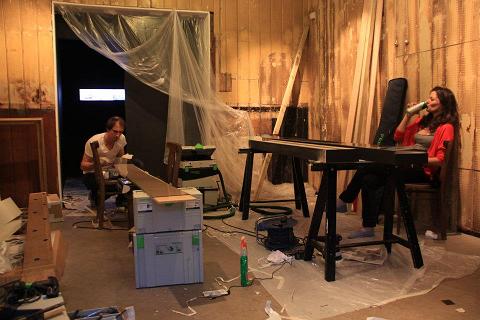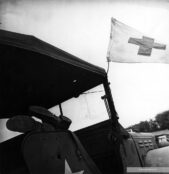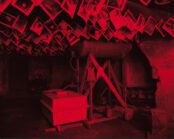[dropcap style=”font-size:100px; color:#992211;”]T[/dropcap]rebuchet’s ongoing series of articles into the oft-overlooked vocation of art curation has been an educational experience for those of us compiling the pieces.
London’s art industry is often spoken of as diverse. Gathering together the views of its curators hammers that message beyond the glib cliche that rolls so easily off the tongue. Vyner Street pop-ups share a city with gallery-endorsed grafitti exhibits; visual investigations into the interface between art and science nest a stroll away from Picassos; to go on would be to simply add to the cliche. But that diversity is reflected in the spaces where art is gathered, shown, sold. Behind them all, whether they are vast atria of the Tate Modern’s ilk, or one-room studios hidden in Shoreditch laneways, are the directors and curators. The ones doing the heavy lifting, physically and metaphorically.
Hanging Offence puts the questions to Fishbar‘s Philipp Ebeling who, as the photos show, is no stranger to the back-end of the curator’s craft.
What first drew you to art?
I grew up in a German village and the visual arts were far removed from my upbringing. 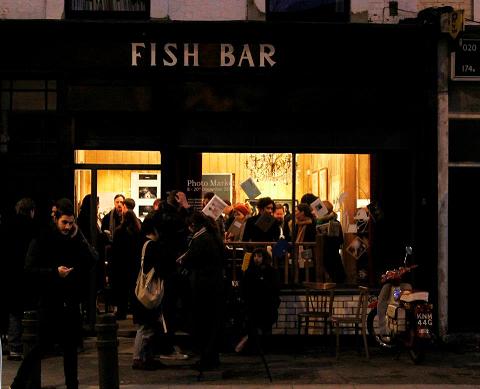 Nobody in my family had remotely artistic genes. We had an old upright piano in the house from an earlier vain attempt by my parents to get my older brother to learn it. I discovered it when I was two and started having lessons when I was three. It became my refuge throughout my childhood and teens and I played incessantly. Strangely I never thought of it as making music, it was just a thing I was doing, mostly on my own, as a sort of escape.
Nobody in my family had remotely artistic genes. We had an old upright piano in the house from an earlier vain attempt by my parents to get my older brother to learn it. I discovered it when I was two and started having lessons when I was three. It became my refuge throughout my childhood and teens and I played incessantly. Strangely I never thought of it as making music, it was just a thing I was doing, mostly on my own, as a sort of escape.
When I was 19 I packed a bag and left everything behind. The piano, my family and friends, everything I had known until then. Hard to say why I did, but I ended up in London and discovered art as a new language to talk about everything I was discovering. It was scary and exciting and still is.
How did your gallery start?
We are a photography gallery. And when we started it was simply the dream to have a space to show really exciting photography. That and the strange circumstance that despite London being full of photographers, there where very few spaces to support and drive it.
Things are changing now, but for us it was a great opportunity.
How did your involvement begin?
Finding an old chippy in East London, stripping it to its foundations and then rebuilding it completely.
What is the vision for this gallery?
We don’t subscribe to any dogma or style in photography. The medium is finally starting to come into its own with lots of very engaged and intelligent people working extremely hard to express their vision with the medium. I think the future will see lots of truly great work emerging, alas [only] supported by non- mainstream outlets, both in digital and print format. We want to be part of this future.
Which artists typify the vision you have for your gallery?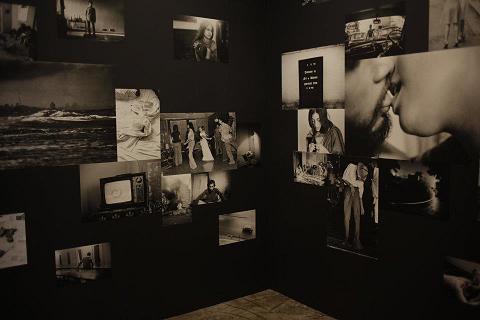
Anyone who understands themselves as author of their own work
What do you dislike most about art?
I read somewhere recently there is a term for the waffle people write when they try to say something clever about art. It’s been termed International Art English. So many people in the art world use it that it’s developing into a distinct language with the sole function of being exclusive. What is the point?, I wonder.
How would you define artistic controversy?
It would be controversial to define.
Do you think that controversy in is a positive force in art or a conceptual red herring?
It can be both. Depending on the intention of the Artist.
What’s been your biggest challenge?
Finding enough hours in the day.
What’s been your biggest success?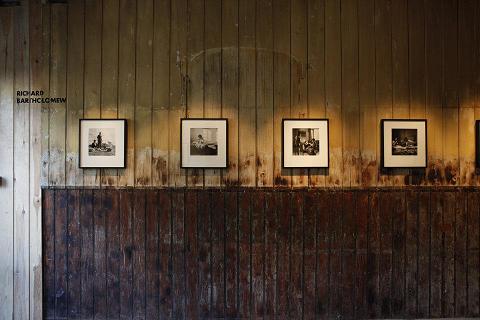
Publishing our first book, Jeddah Diary by Olivia Arthur (co-founder of Fishbar), the book made it on many best of the year lists, including Alec Soth’s and publishing two other titles in the same year that all did very well.
And not going broke doing so.
Who are you five favourite artists and which pieces of theirs do you admire?
I’d rather not answer.
What does the future hold?
For Fishbar, a new show with Italian photographer Lorenzo Vitturi, another book, hopefully some art funding, a film screening of a beautiful doc about Saul Leiter and lots more photography.
Fishbar 176 Dalston Lane, London, E8 1NG
[button link=”http://www.fishbar.ph/”] Fishbar Homepage[/button]

The aim of art is to represent not the outward appearance of things, but their inward significance. – Aristotle

